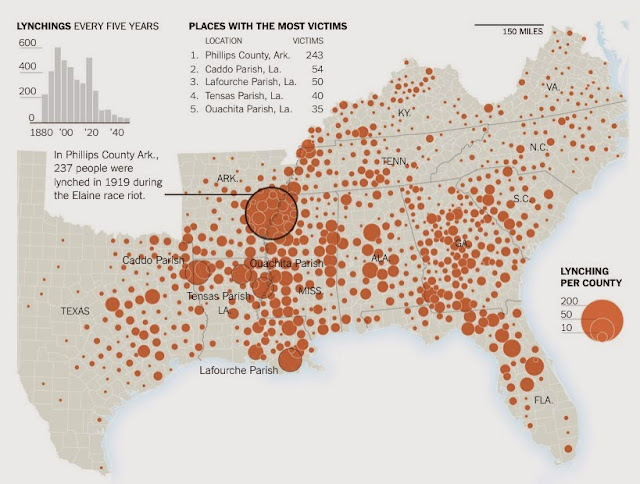Today the
New York Times featured a map showing where lynchings took place in the South between 1877 and 1950.
The accompanying article explains that the map is a product of a report and project from the Montgomery AL based
Equal Justice Initiative. EJI aims to erect markers reminding us of these "racial terror lynchings," just as they have previously marked locations of pre-emancipation slave markets.
EJI director Bryan Stevenson made what he considers a crucial point:
... these brutal deaths were not about administering popular justice, but terrorizing a community.
“Many of these lynchings were not executing people for crimes but executing people for violating the racial hierarchy,” he said, meaning offenses such as bumping up against a white woman or wearing an Army uniform.
But, he continued, even when a major crime was alleged, the refusal to grant a black man a trial — despite the justice system’s near certain outcome — and the public extravagance of a lynching were clearly intended as a message to other African-Americans.
***
We're fooling ourselves if we assume that killings meant to enforce hierarchies happen only in the South or only in the distant past. Now as then, the victims are almost always of people of color, overwhelmingly Blacks -- but these days they are also usually persons who are considered to break the gender rules. As recently as 1985 here in liberal northern California,
Timothy Charles Lee , a Black gay man was hung by a strap near the Concord BART station. Local police ruled his death a suicide, though two men were arrested for a stabbing while wearing Ku Klux Klan robes in the town the same night. I wonder if Concord's gay community has put up a marker?
Today in San Francisco,
48 Hills reports, the LGBT Center issued
a report documenting ongoing public violence experienced especially by transgendered people of color. The housing crunch leads to more homelessness and more people stuck in living situations that are not safe.
**68% of the community has experienced physical violence, 48% sexual violence, 81% harassment — and a full one-third all three. (For transgender people, those numbers jump 17%.)
**Transgender community members are seven times more likely than non-transgender people to feel unsafe in everyday settings: 60% of transgender Latinas feel unsafe walking around during the day.
The truth of these fears is demonstrated by last week's murder of transgender woman
Taja de Jesus in the Bayview district.
 |
| Transwomen of color staged a die-in on the steps of San Francisco City Hall before going into raise issues of violence and safety before the Board of Supervisors. |
|
|
 |
| Several hundred allies gathered round. |
This remains a society that defaults to terror to enforce social conformity, to keep those who have "always" made the rules on top.



No comments:
Post a Comment